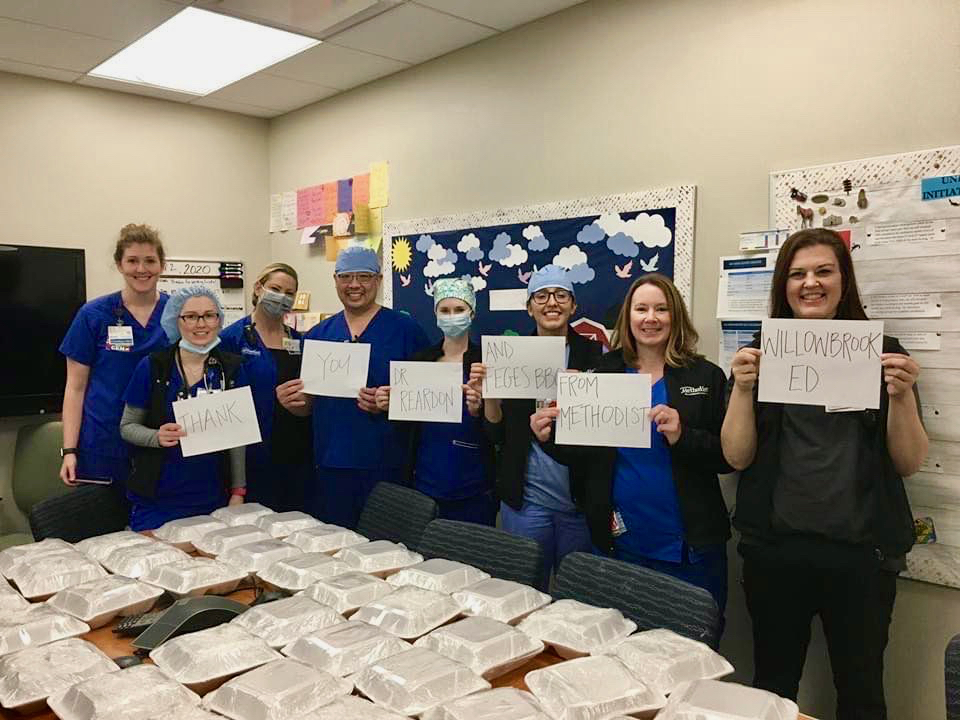Feeding Frontline Keeps Local Business Going
To say we’ve never witnessed a time like this is quite the understatement. Across the nation, populations have been introduced to shell-shocking new normals, ones that involve little to no social interaction, joblessness, isolation, fear, uncertainty – you name it. But right from the start of Houston’s stay-at-home order, it was obvious that the restaurant industry, in particular, would feel an immense pressure to change their business models if they were going to remain in operation.
We’ve watched whiskey operations like Whitmeyer’s Distilling start making hand sanitizer. We’ve seen Harold’s revive its once upon-a-time grocery store concept. Feges BBQ, too, has also switched up their business model and have begun distributing their famed smoked meats via Saturday pop-ups.
Erin Smith Feges, co-owner of Feges BBQ, said she and her husband Patrick recognized in mid-February that the coronavirus had real potential to wreak havoc on their business and began brainstorming how they could keep their heads above water if worse came to worst.
“I remember hearing the first stories about coronavirus leaving China when we were on a family ski trip in Colorado, and it felt to us like it was only a matter of time before it came here, and then quickly after that we heard about the first case in the United States,” she says. “I don’t think we realized all of this would happen, but we started to think to ourselves, ‘We work in an office building, so we are reliant on volumes of people in a closed space for us to serve food. What if people started working from home? What would happen?’”
The Feges’ inclination proved true, and not long after social-distancing measures were put into place, Feges BBQ quickly pivoted to take-out and delivery options for their customers. But when Houston’s “stay at home” precautions were implemented, everything dramatically changed. Today, Feges estimates the business is operating at twenty-five percent of its usual revenue, and as a result, the team has had to furlough most of their staff.
“The takeout and delivery was a lot more work, but it was generating comparable income to what we would normally be getting, but then we saw a huge halt to that when the ‘stay home, work safe’ order was put in place. We continued for a couple of days to try the delivery and takeout, but there were just so many logistical issues, so we decided to close to the public,” she says. “We had to furlough our staff, too, which was one of the hardest days for us as business owners because we have a really small team and we’re really close to everybody.”
Though their delivery and take-out orders have halted, Feges BBQ is still selling smoked meats to the public. On Wednesday afternoons, the restaurant posts a pre-sale menu on their website customers can order from and pick up on Saturday mornings in Spring Branch.
“It’s all cold, bulk, smoked meats that are vacuum-sealed with reheating instructions. For the time being, we are not doing sides, but we might in the future. It’s just that we’re only three people and we’re basically wearing all the hats right now,” she says.
In addition to their Saturday sales, the barbecue team is also taking bulk catering orders, many of which are being sent to healthcare workers. A majority of the catering orders comes from organizations like Feed The Frontline Texas, which is funding meals for first responders for all their work during the coronavirus pandemic. The Feges BBQ team is also feeding unemployed hospitality workers through an organization called Houston Shift Meal.
“[Feed The Frontline] will order the food and we’ll deliver it to the hospital, so it’s a win-win. We get the business, and the healthcare workers get fed. We’re also working with Houston Shift Meal doing weekly deliveries [to displaced restaurant workers] on Thursdays,” she says. “These are things that don’t really generate any revenue for us, but they keep us busy, which I think right now it’s important for us to do what we have always done: working hard during the day and serving people. That’s just in our nature because we’re in the hospitality industry.”
As for how individuals can continue to help local restaurants during this difficult time, Feges recommends donating funds to organizations or campaigns that are financially supporting and/or feeding laid-off hospitality workers, including Southern Smoke Foundation, Houston Shift Meal and a growing Facebook campaign to feed local healthcare workers. She also says even if you aren’t able to go to your favorite restaurant at this time or already having plenty of food in the fridge, buying gift cards or merchandise to support your favorite establishments in the meantime can make all the difference in the world.
“There’s just so many ways to do it, but I think the important thing is we really need to keep the economy going and keep supporting these people who have done so much for us,” Feges says. “Every little bit counts right now.”





